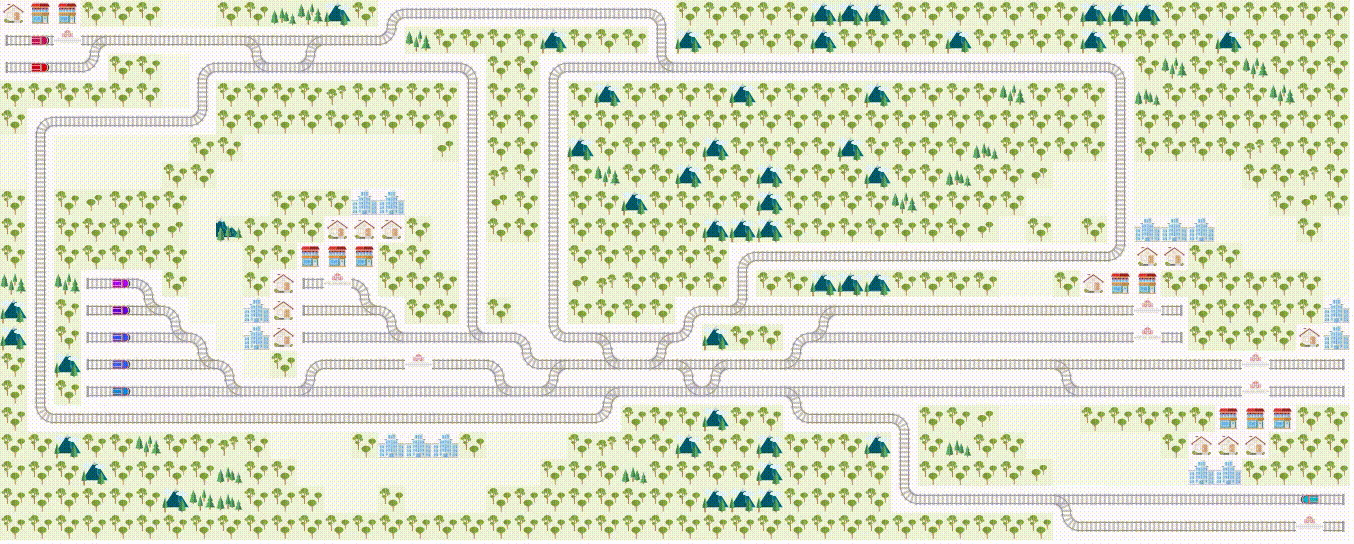⚠️ NOTICE: This starter kit was used for 2019 challenge and has been deprecated in favour of 2020 Flatland challenge's starter kit present here: https://gitlab.aicrowd.com/flatland/neurips2020-flatland-starter-kit
Instructions to make submissions to the SBB CFF Flatland Challenge.
Participants will have to submit their code, with packaging specifications, and the evaluator will automatically build a docker image and execute their agent against an arbitrary number of pre-generated flatland environments.
- Anaconda (By following instructions here) At least version
4.5.11is required to correctly populateenvironment.yml. - flatland-rl (By following instructions here)
IMPORTANT : Please note that you will need
flatland-rlversion>=2.1.7to be able to submit.
- Clone the repository
git clone git@github.com:AIcrowd/flatland-challenge-starter-kit.git
cd flatland-challenge-starter-kit
- Create a conda environment from the provided
environment.yml
conda env create -f environment.yml- Activate the conda environment and install your code specific dependencies
conda activate flatland-rl
# If say you want to install PyTorch
# conda install pytorch torchvision -c pytorch
#
# or you can even use pip to install any additional packages
# for example :
# pip install -U flatland-rl
# which updates the flatland-rl package to the latest version- First lets begin by downloading a small set of test envs, and put them at a location of your choice.
In this exercise, we assume that you will download the test-envs provided at : https://www.aicrowd.com/challenges/flatland-challenge/dataset_files, and will untar them inside
./scratch/test-envs, so that you have a directory structure similar to :
./scratch
└── test-envs
├── Test_0
│ ├── Level_0.pkl
│ └── Level_1.pkl
├── Test_1
│ ├── Level_0.pkl
│ └── Level_1.pkl
├── Test_2
│ ├── Level_0.pkl
│ └── Level_1.pkl
├── Test_3
│ ├── Level_0.pkl
│ └── Level_1.pkl
├── Test_4
│ ├── Level_0.pkl
│ └── Level_1.pkl
├── Test_5
│ ├── Level_0.pkl
│ └── Level_1.pkl
├── Test_6
│ ├── Level_0.pkl
│ └── Level_1.pkl
├── Test_7
│ ├── Level_0.pkl
│ └── Level_1.pkl
├── Test_8
│ ├── Level_0.pkl
│ └── Level_1.pkl
└── Test_9
├── Level_0.pkl
└── Level_1.pkl
-
redis-server: NOTE : Please ensure that you have a redis-server running on localhost. You can find more instructions on how to run redis here -
Run evaluator
# In a separate tab : run local grader
flatland-evaluator --tests <path_to_your_tests_directory>
# If you downloaded the files to the location we specified above, then you should be running :
flatland-evaluator --tests ./scratch/test-envs/
- Run Agent(s)
# In a separate tab :
export AICROWD_TESTS_FOLDER=<path_to_your_tests_directory>
# or on Windows :
#
# SET AICROWD_TESTS_FOLDER=<path_to_your_tests_directory>
python run.py
The software runtime is specified by exporting your conda env to the root
of your repository by doing :
# The included environment.yml is generated by the command below, and you do not need to run it again
# if you did not add any custom dependencies
conda env export --no-build > environment.yml
# Note the `--no-build` flag, which is important if you want your anaconda env to be replicable across all
This environment.yml file will be used to recreate the conda environment inside the Docker container.
This repository includes an example environment.yml
You can specify your software environment by using all the available configuration options of repo2docker. (But please remember to use aicrowd-repo2docker to have GPU support)
Please follow the structure documented in the included run.py to adapt your already existing code to the required structure for this round.
aicrowd.jsonEach repository should have aaicrowd.jsonwith the following content :
{
"challenge_id": "aicrowd_flatland_challenge_2019",
"grader_id": "aicrowd_flatland_challenge_2019",
"authors": ["your-aicrowd-username"],
"description": "sample description about your awesome agent",
"license": "MIT",
"debug": false
}This is used to map your submission to the said challenge, so please remember to use the correct challenge_id and grader_id as specified above.
If you set debug to true, then the evaluation will run on a separate set of 20 environments, and the logs from your submitted code (if it fails), will be made available to you to help you debug.
NOTE : IMPORTANT : By default we have set debug:false, so when you have done the basic integration testing of your code, and are ready to make a final submission, please do make sure to set debug to true in aicrowd.json.
The evaluator will use /home/aicrowd/run.sh as the entrypoint, so please remember to have a run.sh at the root, which can instantitate any necessary environment variables, and also start executing your actual code. This repository includes a sample run.sh file.
If you are using a Dockerfile to specify your software environment, please remember to create a aicrowd user, and place the entrypoint code at run.sh.
If you are unsure what this is all about, you can let run.sh be as is, and instead focus on the run.py which is being called from within run.sh.
To make a submission, you will have to create a private repository on https://gitlab.aicrowd.com/.
You will have to add your SSH Keys to your GitLab account by following the instructions here. If you do not have SSH Keys, you will first need to generate one.
Then you can create a submission by making a tag push to your repository on https://gitlab.aicrowd.com/.
Any tag push (where the tag name begins with "submission-") to your private repository is considered as a submission
Then you can add the correct git remote, and finally submit by doing :
cd flatland-challenge-starter-kit
# Add AIcrowd git remote endpoint
git remote add aicrowd git@gitlab.aicrowd.com:<YOUR_AICROWD_USER_NAME>/flatland-challenge-starter-kit.git
git push aicrowd master
# Create a tag for your submission and push
git tag -am "submission-v0.1" submission-v0.1
git push aicrowd master
git push aicrowd submission-v0.1
# Note : If the contents of your repository (latest commit hash) does not change,
# then pushing a new tag will **not** trigger a new evaluation.
You now should be able to see the details of your submission at : gitlab.aicrowd.com//<YOUR_AICROWD_USER_NAME>/flatland-challenge-starter-kit/issues
NOTE: Remember to update your username in the link above 😉
In the link above, you should start seeing something like this take shape (the whole evaluation can take a bit of time, so please be a bit patient too 😉 ) :
Best of Luck 🎉 🎉



